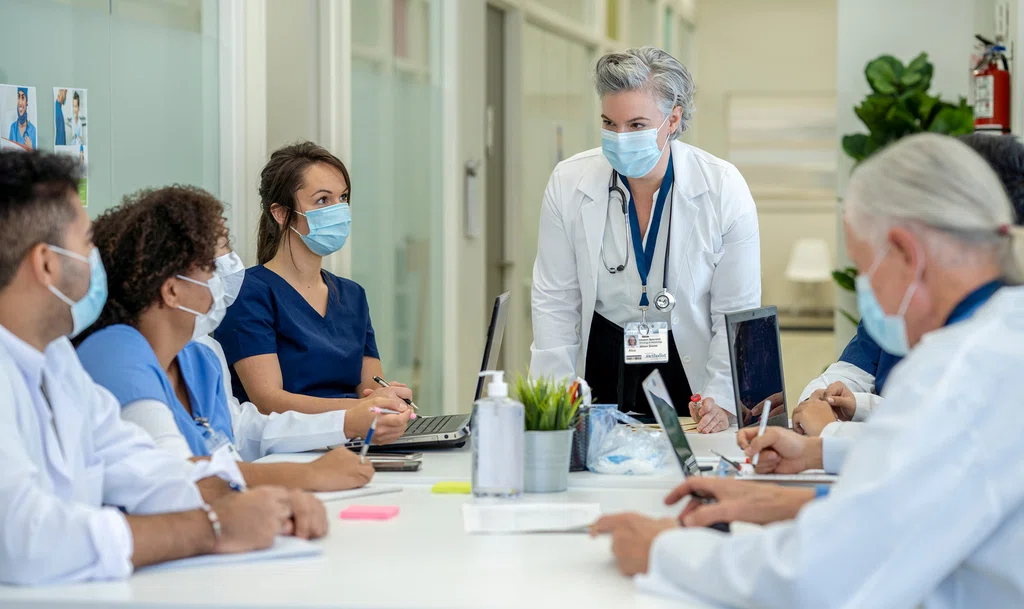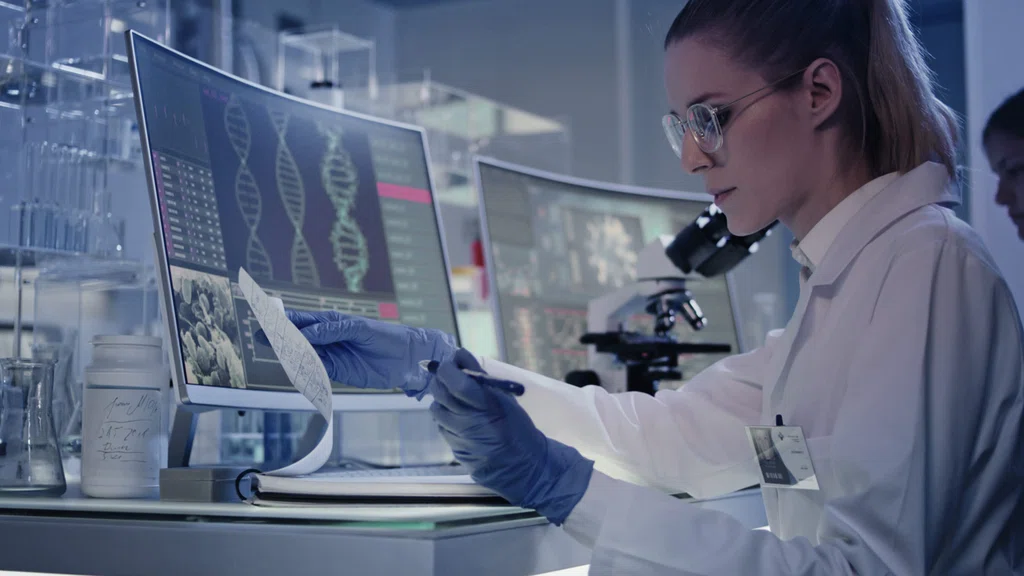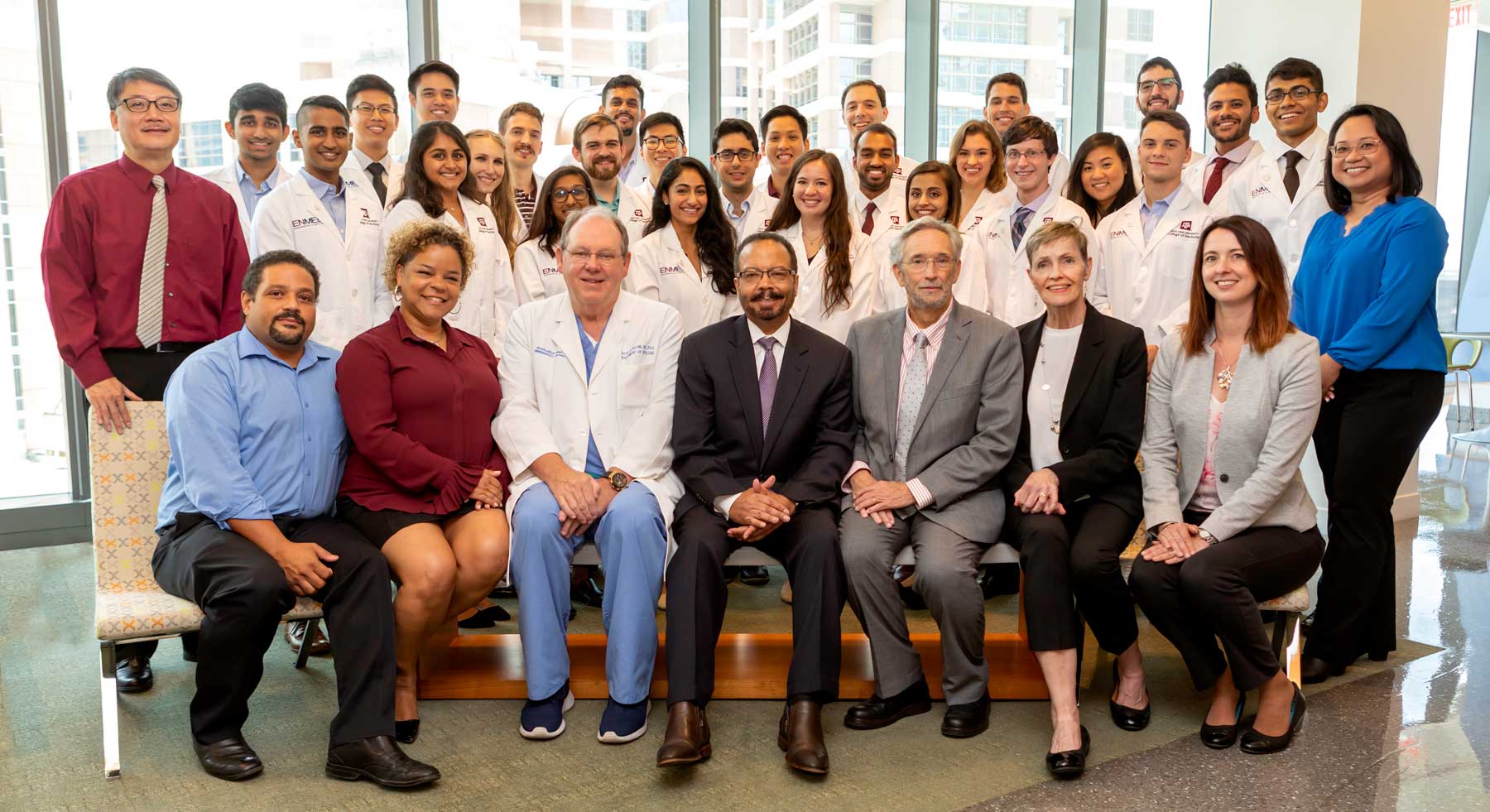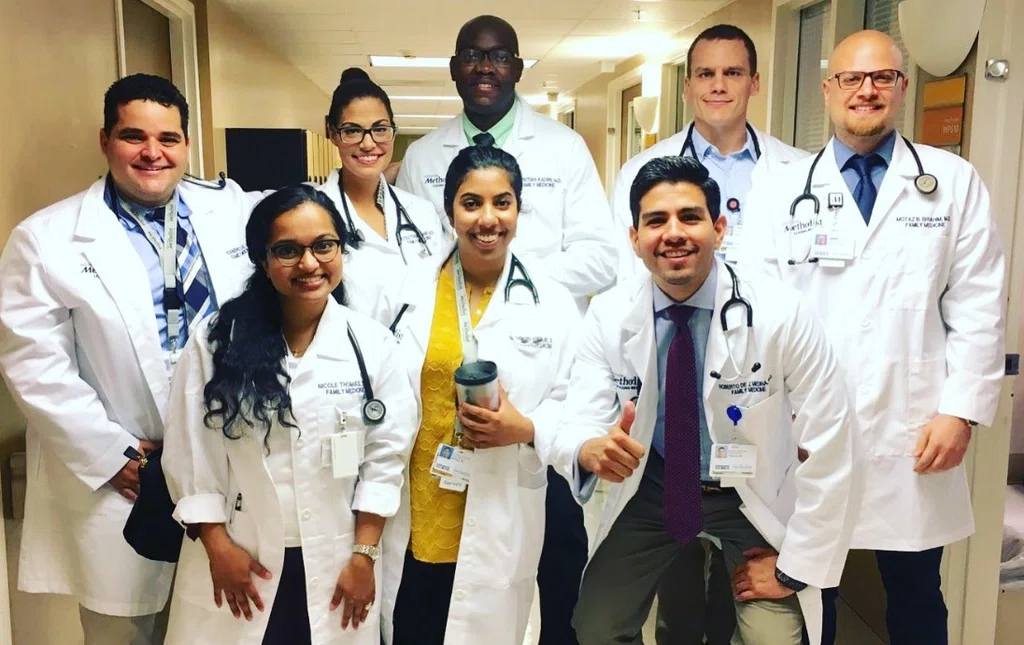
President’s Letter
2023 Metrics
Cycle of Translation
Visionary Gifts

Discovery to Clinic

Innovative Education

Translational Luminaries
Introduction
Jerold B. Katz Academy of Translational Research
Infectious Diseases Research Fund
Houston Methodist Dr. Mary and Ron Neal Cancer Center
Ann Kimball and John W. Johnson Center for Cellular Therapeutics at Houston Methodist
The Food & Health Alliance within the Houston Methodist Lynda K. and David M. Underwood Center for Digestive Disorders, Immunology Center and the Fondren Inflammation Collaborative
Houston Methodist Cockrell Center for Advanced Therapeutics
Paula and Joseph C. “Rusty” Walter III
Translational Research Initiative
COVID-19 Studies
Outcomes Research
Restorative Medicine
Houston Methodist Advances Research into Neural Prosthetics
Noninvasive Spinal Stimulation Works to Restore Movement After Spinal Cord Injury
An Innovative Approach to Treat Even the Most Stubborn-to-Heal Fractures
Cell Encapsulation May Hold the Key to Preventing Cell Transplant Rejection
Houston Methodist, Rice University, Baylor College of Medicine Design Noninvasive Tech to Help Remove Brain’s Metabolic Waste
Houston Methodist Investigators Nanotechnology Investigators Awarded Prestigious Grants from the Department of Defense
Precision Medicine
Cancer Cell Type (Seed) and Tumor Microenvironment (Soil) Control Therapeutic Antibody Delivery and Efficacy
Novel Drug Combination Can Target Triple-Negative Breast Cancer for Treatment
A Houston Methodist and Purdue University Breakthrough May Result in a More Effective Tuberculosis Vaccine
Importance of the Coronary Artery Calcium Score in Risk Assessment and Prevention of Atherosclerotic Cardiovascular Disease
New Virtual Intensive Care Unit Simultaneously Improves Patient Care and Bed Capacity
result
Introduction
Joint Weill Cornell–Houston Methodist Academic Institute Doctoral Program Welcomes its Inaugural Class
Visionary EnMed Program Soars to New Heights
Neural Control of Organ Degeneration and Regeneration (NeuralCODR) Training Program
Faculty and Research Development
Graduate Medical Education



Science in Service
of
Medicineresult
President's letter
2021 Metrics
Cycle of Translation
Visionary Gifts of Hope


Introduction

Ann Kimball and John W. Johnson Center for Cellular Therapeutics at Houston Methodist

Houston Methodist Dr. Mary and Ron Neal Cancer Center

The Food & Health Alliance within the Houston Methodist Lynda K. and David M. Underwood Center for Digestive Disorders, Immunology Center and the Fondren Inflammation Collaborative

Houston Methodist Cockrell Center for Advanced Therapeutics

Paula and Joseph C. “Rusty” Walter III Translational Research Initiative

Jerold B. Katz Academy of Translational Research

Infectious Diseases Research Fund

From Discovery to Clinic


What is "Discovery to Clinic"?

Restorative Medicine


Houston Methodist Advances Research into Neural Prosthetics

Noninvasive Spinal Stimulation Works to Restore Movement After Spinal Cord Injury

An Innovative Approach to Treat Even the Most Stubborn-to-Heal Fractures

Cell Encapsulation May Hold the Key to Preventing Cell Transplant Rejection

Houston Methodist, Rice University, Baylor College of Medicine Design Noninvasive Tech to Help Remove Brain’s Metabolic Waste

Houston Methodist Investigators Nanotechnology Investigators Awarded Prestigious Grants from the Department of Defense

Precision Medicine


Cancer Cell Type (Seed) and Tumor Microenvironment (Soil) Control Therapeutic Antibody Delivery and Efficacy

New Virtual Intensive Care Unit Simultaneously Improves Patient Care and Bed Capacity

Novel Drug Combination Can Target Triple-Negative Breast Cancer for Treatment

A Houston Methodist and Purdue University Breakthrough May Result in a More Effective Tuberculosis Vaccine

Importance of the Coronary Artery Calcium Score in Risk Assessment and Prevention of Atherosclerotic Cardiovascular Disease

Translational Luminaries

Innovative Education
Launching a Legacy of Leading Medicine
Introduction
01
Joint Weill Cornell–Houston Methodist Academic Institute Doctoral Program Welcomes its Inaugural Class
02
Visionary EnMed Program Soars to New Heights
03
Neural Control of Organ Degeneration and Regeneration (NeuralCODR) Training Program
04
Faculty and Research Development
05
Graduate Medical Education


Houston Methodist is committed to building transformative education experiences at the intersections and gaps between disciplines through health science and medical education programs.
Houston Methodist is not degree granting, rather, we forge academic partnerships that bring in measurable results today and offer greater opportunities for tomorrow.
Our residencies, fellowships, research doctoral program and continuing education programs in medicine, research, nursing and pharmacy attract more than 41,344 learners from around the world each year.
01
Joint Weill Cornell–Houston Methodist Academic Institute Doctoral Program Welcomes its Inaugural Class

The Weill Cornell Graduate School of Medical Sciences has expanded its PhD program to an additional campus at the Houston Methodist Academic Institute, the research and education arm of Houston Methodist Hospital in the Texas Medical Center. This is a new enhancement, building upon the 16-year academic affiliation between Weill Cornell Medicine and Houston Methodist to train the next generation of physicians and scientists.
Students have been accepted into the physiology, biophysics and systems biology (BPSB) doctoral program at the Houston Campus of Weill Cornell Graduate School. The program’s focus is on cutting-edge approaches to genomics, bioinformatics and computational biology, molecular and cellular biophysics, computational and systems neuroscience, organogenesis and development, learning, memory and behavior.
The program’s inaugural class includes:
Rachel Dubuque

Dubuque received her undergraduate degree in biochemistry and molecular biology from Michigan State University, where she also served as a research assistant in the Institute of Quantitative Health Science and Engineering.
Rei Abe

Abe is a biology major from New York University. After obtaining his undergraduate degree, he worked as a research assistant in the Department of Cardiovascular Regeneration at the Houston Methodist Academic Institute.
Julio Mejia

Mejia majored in chemical engineering at the University of Texas at Austin. Upon graduation, he gained laboratory experience by working as a research associate and associate lab manager at Kiromic Biopharma.
02
Visionary EnMed Program Soars to New Heights

The EnMed (engineering medicine) program, launched in August 2019, continues to make strides in its mission to create the next generation of physician-engineers, or “physicianeers,” who will solve the medical field’s complex problems through technology development and innovation.
A collaboration between Houston Methodist and Texas A&M University, the EnMed program is part of the university’s Intercollegiate School of Engineering Medicine and is expected to be largest engineering-based medical degree program in the United States the program is currently housed in an 18-story office building renovated by Texas A&M and located in the heart of the Texas Medical Center. Within this facility, EnMed students have access to a simulation center that occupies an entire floor–a Makerspace so students can print 3D models for prototypes. While most of their didactic training will be in this building, all wet anatomy labs happen at the Houston Methodist campus.
In June 2021, Alessandro Grattoni, PhD, the Frank J. and Jean Raymond Centennial Chair and Professor of Nanomedicine at Houston Methodist, announced the student recipients of the Craig Brown and Suzanne Smith & Frank and Jean Raymond Engineering Medicine Capstone Innovator Awards. With this monetary assistance, students began their research on their capstone projects under the mentorship of faculty at Texas A&M University and the Houston Methodist Academic Institute.
The program also welcomed its third and largest class of 49 students in the fall of 2021. Similar to the EnMed seniors, students of the incoming class have a strong background in engineering and have demonstrated a clear passion for innovation. They will also embark on capstone projects that directly address clinical or biomedical challenges.
03
Neural Control of Organ Degeneration and Regeneration (NeuralCODR) Training Program

Neural Control of Organ Degeneration and Regeneration (NeuralCODR) is an interdisciplinary training program at the intersection of neurophysiology and organ engineering/modeling that offers trainees new perspectives on how the brain and organ systems interact in disease and repair.
Seeded by the Paula and Rusty Walter endowment, this two-year post-doctoral training program was designed to fill a critical gap in post-graduate training with an end goal of creating a new generation of scientists, innovators and future leaders in the field of neural control of organ degeneration and regeneration.
Unlike traditional physiology or neuroscience programs, the strategic focus of NeuralCODR is to offer trainees new perspectives on how the brain and organ systems interact in disease and repair by creating a seamless interface between regeneration/disease in neuroscience and the function of organ model systems. The NeuralCODR program also seeks to drive collaborations across often siloed disciplines and provide missing clinical perspectives to the post-doctoral experience.
NeuralCODR was conceived by Philip Horner, PhD, and a team of expert faculty from across several Texas Medical Center institutions that have a rich history of research training, clinical modeling and education, including Rice University, the University of Houston, the University of Texas MD Anderson Cancer Center, the University of Texas Health Science Center at Houston and Baylor College of Medicine. The program is co-directed by Mary C. (Cindy) Farach-Carson, PhD, who serves as director of clinical and translational research at the University of Texas Health Science Center.
2021 NeuralCODR Fellow
Sirena Soriano, PhD
Soriano has established a mentorship team that consists of Sonia Villapol, PhD, Muralidhar Hegde, PhD, and Eamonn Quigley, MD. Her research aims to restore the gut microbiota in a rodent model of Alzheimer’s disease in order to reduce the neurodegeneration that occurs following a traumatic brain injury.
04
Faculty and Research Development

Houston Methodist bolsters academic productivity throughout researchers’ careers with a full complement of individually tailored resources that include one-on-one professional development guidance, cohorted courses and customized workshops.
The experienced development team provides services essential to developing strategic academic priorities and securing external funding, including matching experts with appropriate funding opportunities and providing planning and writing support for grant proposals, manuscripts, outcomes/bug data protocols and other academic publications.
Salim Allana, MD
Dorothy E. Lewis, PhD
In 2021, the department offered 16 workshops and lectures covering various topics and four series were offered, including Career Development, Skills Development/Communication, Grant Writing, and Mentoring and Leadership.
The “Concept to Commercialization” seminar lays the foundation for translating key laboratory discoveries to clinical uses that improve patients’ lives. It provides a practical and efficient process for researchers to bring their innovations to the market.
76
Grants were submitted through Academic Affairs
44 through Faculty Development and
32 through Institutional Development
6 successful grants –
$8.4M and 57 pending outcomes
486
Mentorship hours
05
Graduate Medical Education

Houston Methodist provides an academic health care environment that promotes comprehensive learning opportunities for more than 41,291 physicians and medical students each year through medical student rotations, residency and fellowship programs, procedural skills training through the Houston Methodist Institute for Technology, Innovation & Education (MITIESM) and continuing education courses.
Our 920 medical students work with inpatient teams and one-on-one with subspecialists during rotations in general surgery, family medicine, internal medicine, orthopedic surgery and obstetrics and gynecology. Houston Methodist has 352 residents and fellows placed within 45 programs accredited by the Accreditation Council for Graduate Medical Education (ACGME) and nine Graduate Medical Education Committee-sponsored fellowships.
On the March 2021 Match Day, 60 medical students from around the world officially became incoming residents at Houston Methodist for the 2021-2022 academic year. Of the new group of residents, 32 hailed from US News & World Report-ranked medical schools.
352
Residents/Fellows
59
Graduate Medical Education Programs
45
ACGME Accredited
14
Non-ACGME Accredited
Our residents and fellows join Houston Methodist from throughout the U.S.
and go on to prestigious fellowship opportunities at institutions such as
Mayo Clinic, Cleveland Clinic, and Massachusetts General Hospital.














